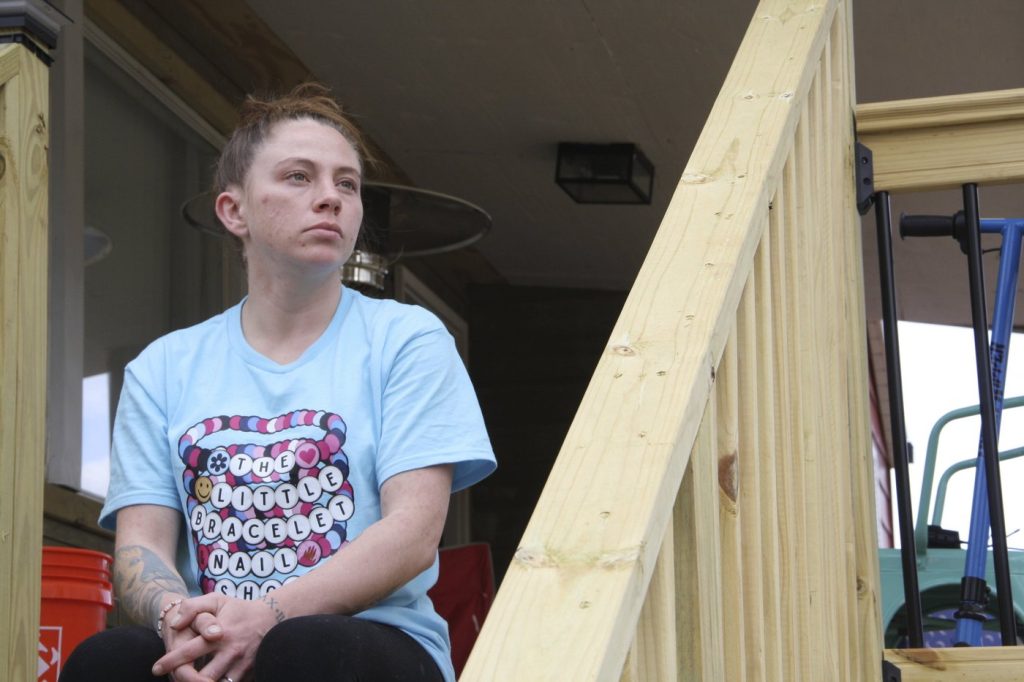SWANNANOA, N.C. (AP) - After Hurricane Helene devastated her home in Swannanoa, North Carolina, Emily Russell felt a glimmer of hope when she secured an appointment with the Federal Emergency Management Agency (FEMA). However, her optimism waned as her requests for assistance were consistently denied or left unresolved. Russell described FEMA's support as "no help," reflecting the frustrations of many residents grappling with the aftermath of the storm, which has been described as the most damaging in North Carolina's history. Open to the controversial remarks made by President Donald Trump about possibly "getting rid of" FEMA, she embodies a growing sentiment among survivors in the region.
The mental strain of living in limited conditions, such as a trailer, has tested the patience of many in the western North Carolina mountains. Russell, who lacked flood insurance, faced additional difficulties as she prepared for the birth of her child. Yet, she found hope through local volunteers who helped rebuild her home. As she cradles her newborn on her newly constructed front porch, she is bittersweetly reminded of the destruction surrounding her, symbolized by the debris pile and political signs in her yard.
Frustration has been compounded by mixed messages on long-term recovery assistance. FEMA's initial role is to provide temporary housing and repair funding while insurance covers most of the costs. However, assurances from politicians—including President Biden—during their tours of the devastation left many residents with the impression that they would receive more extensive aid. As time passed, the complexities of recovery have emerged, leaving many in a state of uncertainty.
Russell's situation represents a broader dissatisfaction with FEMA's processes. After her application was denied despite an inspector declaring her home a total loss, she learned that documentation, such as receipts for personal items, was critical for approval. "It's just a devastating feeling," she lamented, echoing the sentiments of many others in her community. In Buncombe County, where Russell resides, only 70% of those who registered with FEMA received assistance, with most receiving minimal support.
Many residents have voiced similar concerns. Danny Bailey, a retiree in Buncombe County who lost his home, expressed his frustration with FEMA’s limited support, stating, "If this is the way they are, he ought to do away with them," referring to Trump’s remarks on FEMA. Bailey faced challenges in applying for assistance due to a lack of access to technology, highlighting the bureaucratic hurdles that complicate the recovery process. He noted that the agency's response felt insufficient, noting, "Their attitude was, you know, this happened to you, but it's up to you to fix it."
Experts like Miyuki Hino, a professor at the University of North Carolina at Chapel Hill, point to common complaints about FEMA's application procedures, which are often seen as overly complicated. People tend to expect more immediate assistance from an agency primarily focused on short-term needs. The increasing politicization surrounding FEMA and its responsibilities has sparked debates about the federal government's role in disaster response, especially given the rising frequency of climate-related disasters.
Dalton George, mayor pro tempore of Boone, expressed concerns over the potential dissolution of FEMA, noting that local governments lack the resources to fully take on disaster relief. "It feels like people are more anti-FEMA than they are about actually solving some of these problems," he stated. Private organizations, already stretched thin, would need to step in to fill the gaps left by FEMA's potential elimination.
Vickie Revis, another victim of Hurricane Helene, relies heavily on private entities for essential supplies after her home was swept away by the disaster. Although she described receiving over $40,000 from FEMA to assist with her restoration, she still battles grief from her losses. Revis yearns for the memories tied to her former home, expressing that she finds purpose in the rebuilding process, no matter how long it takes.
As the aftermath of Hurricane Helene unfolds, the community in Swannanoa and surrounding areas continues to grapple with the complexities of recovery. Many locals are left questioning the effectiveness of FEMA and seeking clarity on the path forward as they rebuild their lives amidst ongoing challenges.










